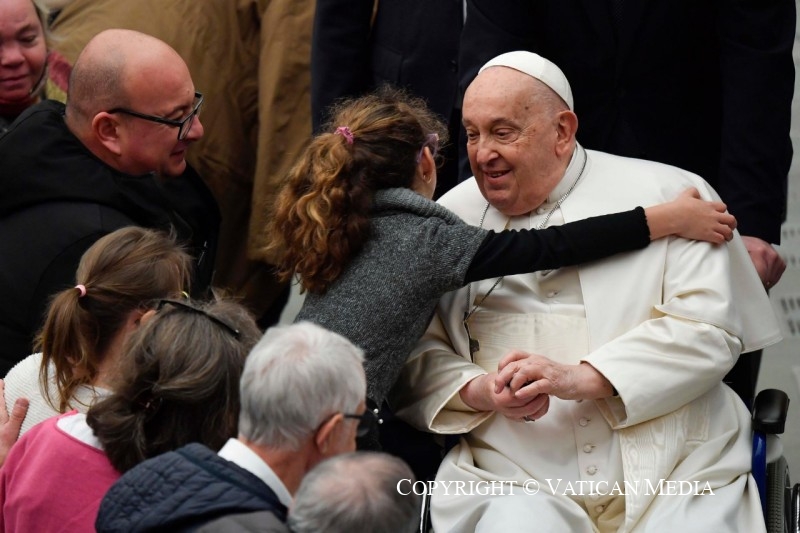Pope calls for two states, Palestine and Israel, ‘free and with good relations’
At his Wednesday audience, Francis repeated that "War is always a defeat." Through the intercession of John Paul II 10 years after his canonisation, the pontiff called for "the gift of peace" in Ukraine and Myanmar too. In the catechesis on the life of grace according to the Spirit, he stressed that the theological virtues of faith, hope and charity are an "antidote to self-sufficiency".
Vatican City (AsiaNews) – Pope Francis spoke this morning from St Peter's Square in his Wednesday general audience. At the end of special greetings to the Italian-speaking pilgrims, he called for two states, Palestine and Israel, “free and with good relations” to put an end to the great pain that has been growing for months in that region of the world.
“Let us also pray for the Middle East, for Gaza”, he said, in places where war causes “so much suffering”, in countries that know war, so that they may live in peace. “War,” Francis said, “is always a defeat.”
Following this line, the pontiff added that his “thoughts go out to tormented Ukraine, Palestine, Israel, Myanmar, who are at war, and so many other countries”.
Speaking about the people who benefit from conflicts, from death, at a time in history with record military spending in the world, Francis setting off an applause from the square when he said: “[T]hose who profit the most are the arms manufacturers”.
As the recently released SIPRI report shows, military spending jumped 6.8 per cent worldwide last year over 2022 with the United States, China and Russia taking top spot.
"Please, let us pray for peace. Let us pray,” Francis repeated, sparking another, more intense round of applause from the crowd of pilgrims in St Peter's.
“Let us pray for the martyred Ukraine, it suffers so much, so much. Young soldiers go to their deaths. Let us pray," the Holy Father went on to say, calling for prayers several times. “Let us pray for peace.”
Greeting Polish-speaking pilgrims, the Holy Father mentioned the tenth anniversary of the canonisation of Saint John Paul II, next Saturday. When mentioned, the name Wojtyła was greeted by a long round of applause.
“Looking at his life we can see what man can achieve by accepting and developing God's gifts: faith, hope and charity," Francis said, thus introducing the three theological virtues cited in the catechesis read at the start of the audience.
“Remain faithful to his legacy, promote life, and do not be deceived by the culture of death," Francis said addressing the Polish pilgrims. “Through his intercession we ask God for the gift of peace, for which he as pope was so committed," he added.
Before ending the audience with the recitation of the Pater Noster and the Apostolic Blessing, the pontiff greeted members of religious groups in the square, including the Franciscan Missionary Sisters of the Child Jesus who are currently holding their general chapter.
“Finally, my thoughts go to the young, the sick, the elderly, and the newlyweds," Pope Francis said before noting that tomorrow, 25 April, is the liturgical feast of Saint Mark.
The Evangelist " described with vivacity and concreteness the mystery of the Person of Jesus of Nazareth. I invite all of you to let yourselves be fascinated by Christ to collaborate with enthusiasm and fidelity in building the Kingdom of God," the pope said.
The catechesis read at the beginning of the audience and summarised in various languages is part of the cycle of in-depth studies on Vices and Virtues.
After exploring the meanings of the cardinal virtues - prudence, justice, fortitude, and temperance - over the past four weeks, today's topic, which started with a reading from the Letter to the Colossians (Col 1:3-5), was the life of grace according to the Spirit.
In fact, on the journey "towards the fullness of life, which belongs to the destiny of every person", the Christian “enjoys the special assistance of the Holy Spirit”.
This "is implemented with the gift of three other, distinctly Christian virtues, [. . .] fundamental attributes, which characterize the life of the Christian,” namely “faith, hope and charity.”
Pope Francis urged pilgrims gathered for the occasion to chant these three words, three theological virtues, “insofar as they are received and lived out in relationship with God, to differentiate them from the other four, called ‘cardinal’ insofar as they constitute the ‘hinge’ (It. cardine) of a good life.” Together, they form a "wonderful septenary”.
The theological virtues in the Catechism of the Catholic Church “are the foundation of Christian moral activity, they animate it and give it its special character. They inform and give life to all the moral virtues,” the Holy Father said.
Their gift “is existence lived in the Holy Spirit”, and those who believe in Christ are “never alone" but walk “in the footsteps of Jesus, the Master.”
Such theological virtues are "the great antidote to self-sufficiency," Francis explained, for pride is a "powerful poison: a drop of it is enough to spoil a whole life marked by goodness.”
By contrast, “Goodness needs a lot of discretion, a lot of kindness,” and this means not “perform[ing] every action in life only for ourselves”.
Indeed, “if we open our hearts to the Holy Spirit – the Master of the interior life – He revives the theological virtues in us,” and “if our heart is hardened, God softens it with His love.”







.png)










